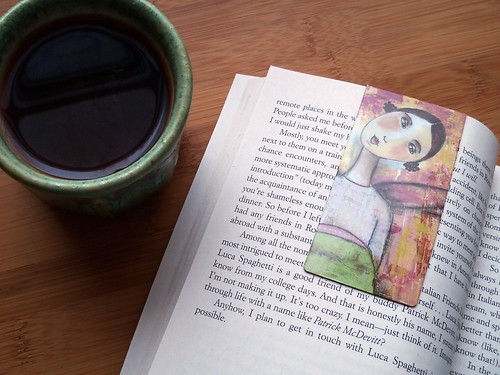“This sentence has five words. Here are five more words. Five-word sentences are fine. But several together become monotonous. Listen to what is happening. The writing is getting boring. The sound of it drones. Its like a stuck record. The ear demands some variety. Now listen. I vary the sentence length, and I create music. Music. The writing sings. It has a pleasant rhythm, a lilt, a harmony. I use short sentences. And I use sentences of medium length. And sometimes, when I am certain the reader is rested, I will engage him with a sentence of considerable length, a sentence that burns with energy and builds with all the impetus of a crescendo, the roll of the drums, the crash of the cymbals—sounds that say listen to this, it is important.”
—Gary Provost
 |
| Photo credit: A Girl With Tea on Flickr |
I love that quote for several reasons, the most important of which being that it teaches a valuable lesson through example.
You see, writing isn’t just about conveying a story or message—although that’s a large part of it. It’s about conveying meaning in the purest way possible, in a manner that doesn’t distract the reader from the meaning, but enhances the experience.
I’m not talking about purple prose—the issue with purple prose is that the language becomes so flowery and overdone that it distracts from the intended focus of the words.
Instead, I’m talking about reflecting the rhythm of rain not just through description, but through the cadence of the sentences. About making a reader’s heart pound as they race through an exciting scene with shorter paragraphs, then slowing them down with longer sentences and blocks of text during a resting period.
Because while forgetting to do this may not change the meaning of the story, it will change the reader’s experience as they work through the pages. An exciting scene weighed down by large blocks of text may lag and feel monotonous, and a would-be breathtaking description may fall flat.
I’m not here to tell you to start obsessing over your sentence and paragraph length, but it’s certainly something to be aware of while writing and revising. Take note of the cadence of your words—read them aloud and listen to the rhythm of the sentences.
Make sure that your readers can hear you say, listen to this, it’s important.
Do you pay attention to sentence or paragraph length while writing or revising?
Twitter-sized bites:
Do sentence and paragraph length change the reader's experience of your writing? One writer says yes. (Click to tweet)
Do you pay attention to the rhythm of your writing? Here's why you may want to. (Click to tweet)
I am always aware of sentence length. I tend to use really long sentences a lot, which a lot of people don't seem to like, but I don't think they appreciate the flow of it. Though I could just be young and arrogant
ReplyDeleteI think long sentences can work, but if the same sentence type is overused (long or short), then it can quickly become tiring. Variation is key.
ReplyDeleteAgreed! Thank you, mood!
ReplyDeleteYes! Agreed on all three counts, particularly the bit about reading. Practice is absolutely a necessity, and when you're not actively practicing (that is, writing), one of the best ways to continue to improve is to pay attention to the words on the page while reading.
ReplyDeleteFascinating! I hadn't really considered this before, but this example really makes a great point.
ReplyDeleteThank you, Jennifer! The quote is the best example I've ever seen illustrating the point of rhythm.
ReplyDelete